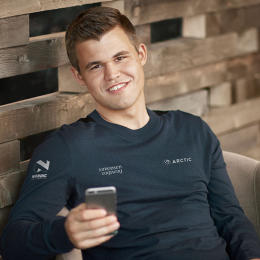A smartphone app called Play Magnus mimics Carlsen's playing style at different stages in his career, beginning at age 5.
As world chess champion Magnus Carlsen defends his title against Russian grandmaster Sergey Karjakin in this month's championship in New York, a smartphone app called Play Magnus invites users to test their own skill against simulated versions of Carlsen from different stages throughout his life and career.
The app, originally released in 2014, was developed by a team including Tord Romstad, one of the creators of Stockfish, a celebrated open-source chess engine, and does more than simply regurgitate moves historically played by Carlsen. The engine actually emulates his style of play at various ages—progressing from the aggressive style of his early years as a chess prodigy to his more thoughtful and defensive adult play.

"Openings are played like he had played at that age, endgames are played in the same way," says Kate Murphy, CEO of Play Magnus. "When Magnus plays himself in the app he'll actually say, 'I remember this game, it was against so-and-so on such-and-such a date.'"
Since its launch, the Play Magnus app has seen close to 1 million downloads, but its creators noticed a limitation: Somewhere around the age that most of us are mastering our timetables, Carlsen simply became too good a chess player for many amateur players to compete with. After all, Carlsen, who turns 26 later this month, was first named a grandmaster at age 13, one of the youngest in the game's history to hold that rank.

"Everyone kept getting stuck on the Play Magnus app," says Murphy. "Everyone kept getting stuck on age 8 and age 9."
To give users a chance of improving their games, the Play Magnus team released a second app this week, dubbed Magnus Trainer. That app, available for iOS with an Android release to follow, provides a series of gamelike chess training exercises designed to help players improve their skills, even if they're still learning how the pieces move.
Some feature more abstract challenges, like navigating chess pieces through a layout based on Carlsen's family cabin in his native Norway, or even moving chess pieces in their signature patterns to escape from nightmarish monsters. One game, called Beach Bounty, begins with players navigating chess pieces to capture stationary sea shells on the beach, but as players progress, they begin having to face off against other chess pieces that could capture them back.

More advanced players, or those looking for a more conventional experience, can also step through interactive versions of Carlsen's historic games, punctuated by challenges to guess which move Carlsen took in a particular position and explanations of his actual tactics.
"Even very advanced players can come in and learn from that section of theory," says Murphy.
Magnus Trainer launched with 11 mini games, developed in part by Carlsen and other grandmasters, including one of his former coaches, and the company plans to roll out more games in the weeks to follow. The games are tested on actual players to make sure they actually learn the skills they're intended to pick up, Murphy says.
The company also plans to unveil multiplayer support in future versions of Play Magnus and will add the current championship competition's games to the theory section of Magnus Trainer. Ultimately, they'll also help train a version of Play Magnus's engine emulating Carlsen's play at age 26, Murphy says, though it's likely that his current level of play will be out of reach for most at-home opponents.
"Most people can defeat Magnus, age 5," says Murphy. "From the age of 7 is when he started to have competitive fervor."